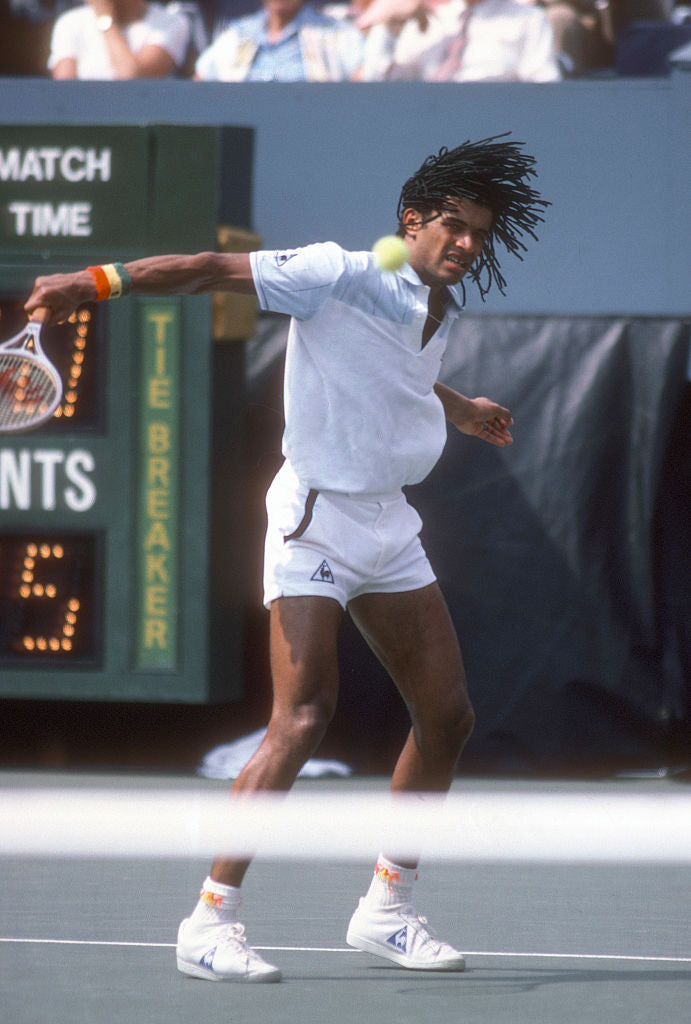Yannick Noah, a French tennis champion with a lasting impact

Discovered at a local clinic in Yaounde, Cameroon, hitting with – not a racket – but a wooden board, an 11-year-old is handpicked by Arthur Ashe, whisked to one of France’s finest tennis academies, and launched to a career of 40 titles, a French Open crown, and pop music superstardom.
Were that the plot of a movie, you’d call it over the top. Yet that’s the story of 2005 Tennis Hall of Fame inductee and 1983 French Open champion, Yannick Noah. Arthur Ashe may be the world’s most famous black tennis athlete but Yannick Noah’s global cultural impact – tennis, entertainment, coaching, charity – rivals even the most notable athletes from any sport.
A French tennis champion
One of the first black tennis players to achieve the world spotlight post-Ashe, Noah was one of the first tennis-as-entertainment athletes. His sliding, jumping, athletic shots, on court antics, and free spirit call to mind the likes of today’s Monfils or even Kyrgios – with more discipline and humility. He too was labeled, at times, a gimmicky player. Flash over substance. A guy who’d always be good but never great. That is until he became France’s next tennis hope.
Following two major quarterfinal appearances, Noah broke through at the 1983 French Open. While winning the tournament, dropping only a set, defeating 7-time slam winner Mats Wilander, he put to bed doubts about his ability to sustain patience. He brought the French Open crown back to a Frenchmen for the first time in 37 years. And, in a full circle moment, was interviewed afterward by none other than Arthur Ashe.
A fan favorite, due to his charisma, play style, and even status as a tennis style icon, Noah went on to quarter and semi-final appearances at the Australian and US Open. Though he continued to have his most Grand Slam success as hometown hero at the French where he reached the quarters or better five times and remains the last male French player to win the tournament.

Singles and doubles success turned to legendary Davis Cup coach
More impressive than his singles – his simultaneous doubles success is where his versatility shined.
Following his 1983 singles title, Noah stormed back the next year in doubles to win the 1984 French Open with partner Henri Leconte (Noah reached quarters in singles that year too). Hot on its heels was an ’85 US Open final run. Then another French Open final appearance in ’86 after which he claimed the #1 doubles ranking and held it for 19 weeks. His consistent presence in the top 10 of both singles and doubles, and statistical symmetry between the two (23 pro singles titles, 16 doubles), is unheard of in today’s game.
This full scale feel for the game made him the ideal coach for France’s Davis Cup team – a role reserved for one of a country’s most prominent and respected tennis figures. In 1991, he took over leadership of the team on which, as a player, he amassed 39 wins and a 1982 finalist finish. He coached the team to a cup championship in ‘91, beating the top seeded USA team. Won it all again in 1996, over Sweden. And a full 21 years later came back for a 3rd, leading a team of modern-day tennis greats like Gasquet and Tsonga to the championship over Belgium.

And then there’s the music…
An entertainer for life, Noah was not out of the public eye for long. Promptly after his retirement in 1991, he began recording. His sound largely considered pop with a hint of reggae. Despite the reputation of the medium, and the easy charm Noah brings to it, his musical ambitions required an athlete’s dedication. As it took a decade of toiling and self-admitted retraining before his 2000 album – his fourth – titled, Yannick Noah, became a smash success. It went diamond in France, platinum in Belgium, and topped the charts in both countries. His next seven albums would perform similarly, and he made his United States debut in 2009 in New York City.
Noah’s most recurring musical theme is a return to his Cameroon roots and the joy that brought to his life. Listen for yourselves with one of his most famous singles, Back to Africa. He continues to make music today and released his latest album, La Marfee, in 2022.
Leaving behind a legacy in tennis, culture and charity
Still the French Davis Cup coach and musician, Noah is also very active charitably. His foundation, Fete le Mur, brings tennis and education to inner cities at 74 locations worldwide and he regularly lends his songs, performances, and their proceeds to telethons and causes like Sol En Si – a foundation that supports children suffering from the AIDS virus.
Among the most famous black tennis players in history, Yannick Noah’s story is perhaps less known in the tennis world. But, as is the trademark of a true great, his legacy looms large and his influence is permanent in the game and culture we know today.






